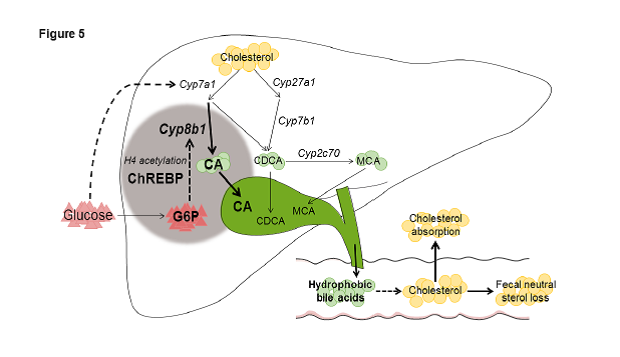
New Key Publication: Glucose-6-phosphate regulates hepatic bile acid synthesis in mice

It is well-established that, besides facilitating lipid absorption, bile acids act as signaling molecules that modulate glucose and lipid metabolism. Bile acid metabolism, in turn, is controlled by several nutrient-sensitive transcription factors. Altered intrahepatic glucose signaling in type 2 diabetes associates with perturbed bile acid synthesis. However, an independent role of glucose in regulation of bile acid metabolism has as yet not been established.
We aimed to characterize the regulatory role of the primary intracellular metabolite of glucose, glucose-6-phosphate (G6P), on bile acid metabolism. Hepatic gene expression patterns and bile acid composition were analyzed in mice that accumulate G6P in the liver, i.e., liver-specific glucose-6-phosphatase knockout (L-G6pc -/- ) mice, and mice treated with a pharmacological inhibitor of the G6P-transporter.
Hepatic G6P accumulation induces Cyp8b1 expression, which is mediated by the major glucose-sensitive transcription factor Carbohydrate Response Element Binding Protein (ChREBP). Activation of the G6P-ChREBP-CYP8B1 axis increases the relative abundance of cholic acid-derived bile acids and induces physiologically relevant shifts in bile composition.
The G6P-ChREBP-dependent change in bile acid hydrophobicity associates with elevated plasma campesterol/cholesterol ratio and reduced fecal neutral sterol loss, compatible with enhanced intestinal cholesterol absorption.
CONCLUSION: We report that G6P, the primary intracellular metabolite of glucose, controls hepatic bile acid synthesis. Our work identifies hepatic G6P-ChREBP-CYP8B1 signaling as a regulatory axis in control of bile acid and cholesterol metabolism
- Hoogerland JA
- Lei Y
- Wolters JC
- de Boer JF
- Bos T
- Bleeker A
- Mulder NL
- van Dijk TH
- Kuivenhoven JA
- Rajas F
- Mithieux G
- Haeusler RA
- Verkade HJ
- Bloks VW
- Kuipers F
- Oosterveer MH
More news
-
15 September 2025
Successful visit to the UG by Rector of Institut Teknologi Bandung
